The Captain, May 1905
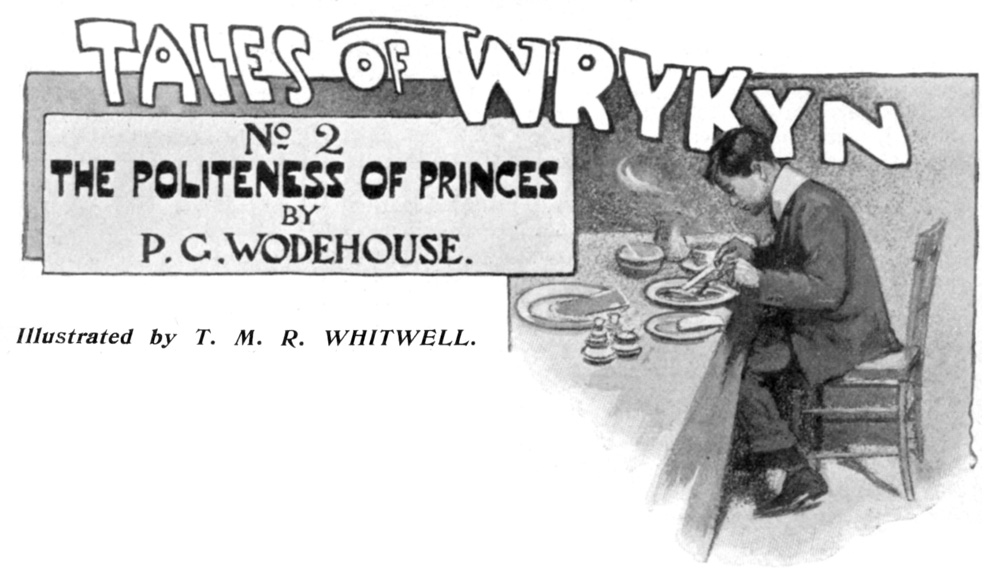
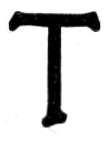 HE
painful case of G. Montgomery Chapple, bachelor, of Seymour’s house, Wrykyn.
Let us examine and ponder over it.
HE
painful case of G. Montgomery Chapple, bachelor, of Seymour’s house, Wrykyn.
Let us examine and ponder over it.
It has been well said that this is the age of the specialist. Everybody, if they wish to leave the world a better and happier place for their stay in it, should endeavour to adopt some speciality and make it their own. Chapple’s speciality was being late for breakfast. He was late not once or twice, but every day. Sometimes he would scramble in about the time of the second cup of coffee, buttoning his waistcoat as he sidled to his place. Generally he would arrive just as the rest of the house were filing out; when, having lurked hidden until Mr. Seymour was out of the way, he would enter into private treaty with Herbert, the factotum, who had influence with the cook, for Something Hot and maybe a fresh brew of coffee. For there was nothing of the amateur late-breakfaster about Chapple. Your amateur slinks in with blushes deepening the naturally healthy hue of his face, and, bolting a piece of dry bread and gulping down a cup of cold coffee, dashes out again, filled more with good resolutions for the future than with food. Not so Chapple. He liked his meals. He wanted a good deal here below, and wanted it hot and fresh. Conscience had but a poor time when it tried to bully Chapple. He had it weak in the first round.
But there was one more powerful than Conscience—Mr. Seymour. He had marked the constant lateness of our hero, and disapproved of it.
Thus it happened that Chapple, having finished an excellent breakfast one morning some twenty minutes after everybody else, was informed as he sat in the junior day-room trying, with the help of an illustrated article in a boys’ paper, to construct a handy model steam-engine out of a reel of cotton and an old note-book—for his was in many ways a giant brain—that Mr. Seymour would like to have a friendly chat with him in his study. Laying aside his handy model steam-engine, he went off to the housemaster’s study.
“You were late for breakfast to-day,” said Mr. Seymour, in the horrid, abrupt way housemasters have.
“Why, yes, sir,” said Chapple, pleasantly.
“And the day before.”
“Yes, sir.”
“And the day before that.”
Chapple did not deny it. He stood on one foot and smiled a propitiating smile. So far Mr. Seymour was entitled to demand a cigar or cocoanut every time.
The housemaster walked to the window, looked out, returned to the mantelpiece, and shifted the position of a china vase two and a quarter inches to the left. Chapple, by way of spirited repartee, stood on the other leg and curled the disengaged foot round his ankle. The conversation was getting quite intellectual.
“You will write out——”
“Sir, please, sir——” interrupted Chapple in an “I-represent-the defendant-m’lud” tone of voice.
“Well?”
“It’s awfully hard to hear the bell from where I sleep, sir.”
Owing to the increased numbers of the house this term Chapple had been removed from his dormitory proper to a small room some distance away.
“Nonsense. The bell can be heard perfectly well all over the house.”
There was reason in what he said. Herbert, who woke the house of a morning, did so by ringing a bell. It was a big bell, and he enjoyed ringing it. Few sleepers, however sound, could dream on peacefully through Herbert’s morning solo. After five seconds of it they would turn over uneasily. After seven they would sit up. At the end of the first quarter of a minute they would be out of bed, and you would be wondering where they picked up such expressions.
Chapple murmured wordlessly in reply. He realised that his defence was a thin one. Mr. Seymour followed up his advantage.
“You will write a hundred lines of Vergil,” he said, “and if you are late again to-morrow I shall double them.”
Chapple retired.
This, he felt, was a crisis. He had been pursuing his career of unpunctuality so long that he had never quite realised that a time might come when the authorities would drop on him. For a moment he felt that it was impossible, that he could not meet Mr. Seymour’s wishes in the matter; but the bull-dog pluck of the true Englishman caused him to reconsider this. He would at least have a dash at it.
“I’ll tell you what to do,” said his friend, Brodie, when consulted on the point over a quiet pot of tea that afternoon. “You ought to sleep without so many things on the bed. How many blankets do you use, for instance?”
“I don’t know,” said Chapple. “As many as they shove on.”
It had never occurred to him to reckon up the amount of his bedclothes before retiring to rest.
“Well, you take my tip,” said Brodie, “and only sleep with one on. Then the cold’ll wake you in the morning, and you’ll get up because it’ll be more comfortable than staying in bed.”
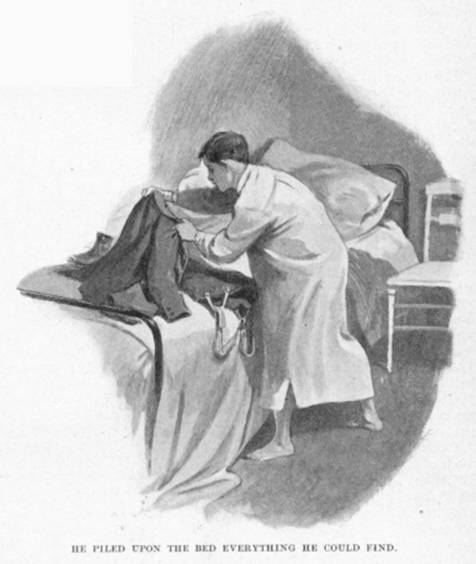 This
scientific plan might have worked. In fact, to a certain extent it did work. It
woke Chapple in the morning, as Brodie had predicted; but it woke him at the
wrong hour. It is no good springing out of bed when there are still three hours
to breakfast. When Chapple woke at five the next morning, after a series of
dreams, the scenes of which were laid mainly in the Arctic regions, he first
sneezed, then he piled upon the bed everything he could find, including his
boots, and then went to sleep again. The genial warmth oozed through his form,
and continued to ooze until he woke once more, this time at eight-fifteen.
Breakfast being at eight, it occurred to him that his position with Mr. Seymour
was not improved. While he was devoting a few moments’ profound meditation to
this point the genial warmth got in its fell work once again. When he next
woke, the bell was ringing for school. He lowered the world’s record for rapid
dressing, and was just in time to accompany the tail of the procession into the
form-room.
This
scientific plan might have worked. In fact, to a certain extent it did work. It
woke Chapple in the morning, as Brodie had predicted; but it woke him at the
wrong hour. It is no good springing out of bed when there are still three hours
to breakfast. When Chapple woke at five the next morning, after a series of
dreams, the scenes of which were laid mainly in the Arctic regions, he first
sneezed, then he piled upon the bed everything he could find, including his
boots, and then went to sleep again. The genial warmth oozed through his form,
and continued to ooze until he woke once more, this time at eight-fifteen.
Breakfast being at eight, it occurred to him that his position with Mr. Seymour
was not improved. While he was devoting a few moments’ profound meditation to
this point the genial warmth got in its fell work once again. When he next
woke, the bell was ringing for school. He lowered the world’s record for rapid
dressing, and was just in time to accompany the tail of the procession into the
form-room.
“You were late again this morning,” said Mr. Seymour, after dinner.
“Yes, sir. I overslebbed myselb, sir,” replied Chapple, who was suffering from a cold in the head.
“Two hundred lines.”
“Yes, sir.”
Things had now become serious. It was no good going to Brodie again for counsel. Brodie had done for himself, proved himself a fraud, an idiot. In fine, a rotter. He must try somebody else. Happy thought. Spenlow. It was a cold day, when Spenlow got left behind. He would know what to do. There was a chap for you, if you liked! Young, mind you, but what a brain! Colossal!
“What I should do,” said Spenlow, “is this. I should put my watch on half an hour.”
“What ’ud be the good of that?”
“Why, don’t you see? You’d wake up and find it was ten to eight, say, by your watch, so you’d shove on the pace dressing, and nip downstairs, and then find that you’d really got tons of time. What price that?”
“But I should remember I’d put my watch on,” objected Chapple.
“Oh, no, probably not. You’d be half asleep, and you’d shoot out of bed before you remembered, and that’s all you’d want. It’s the getting out of bed that’s so difficult. If you were once out, you wouldn’t want to get back again.”
“Oh, shouldn’t I?” said Chapple.
“Well, you might want to, but you’d have the sense not to do it.”
“It’s not a bad idea,” said Chapple. “Thanks.”
That night he took his Waterbury, prised open the face with a pocket-knife as if he were opening an oyster, put the minute hand on exactly half an hour, and retired to bed satisfied. There was going to be no nonsense about it this time.
I am sorry to disappoint the reader, but facts are facts, and I must not tamper with them. It is, therefore, my duty to state, however reluctantly, that Chapple was not in time for breakfast on the following morning. He woke at seven o’clock, when the hands of the watch pointed to seven-thirty. Primed with virtuous resolutions, he was just about to leap from his couch, when his memory began to work, and he recollected that he had still an hour. Punctuality, he felt, was an excellent thing, a noble virtue, in fact, but it was no good overdoing it. He could give himself at least another half hour. So he dozed off. He woke again with something of a start. He seemed to feel that he had been asleep for a considerable time. But no. A glance at the watch showed the hands pointing to twenty-five to eight. Twenty-five minutes more. He had a good long doze this time. Then, feeling that now he really must be getting up, he looked once more at the watch, and rubbed his eyes. It was still twenty-five to eight.
The fact was that, in the exhilaration of putting the hands on, he had forgotten that other and even more important operation, winding up. The watch had stopped.
There are few more disturbing sensations than that of suddenly discovering that one has no means of telling the time. This is especially so when one has to be in a certain place by a certain hour. It gives the discoverer a weird, lost feeling, as if he had stopped dead while all the rest of the world had moved on at the usual rate. It is a sensation not unlike that of the man who arrives on the platform of a railway station just in time to see the tail-end of his train disappear.
Until that morning the world’s record for dressing (set up the day before) had been five minutes, twenty-three and a fifth seconds. He lowered this by two seconds, and went downstairs.
The house was empty. In the passage that led to the dining-room he looked at the clock, and his heart turned a somersault. It was five minutes past nine. Not only was he late for breakfast, but late for school, too. Never before had he brought off the double event.
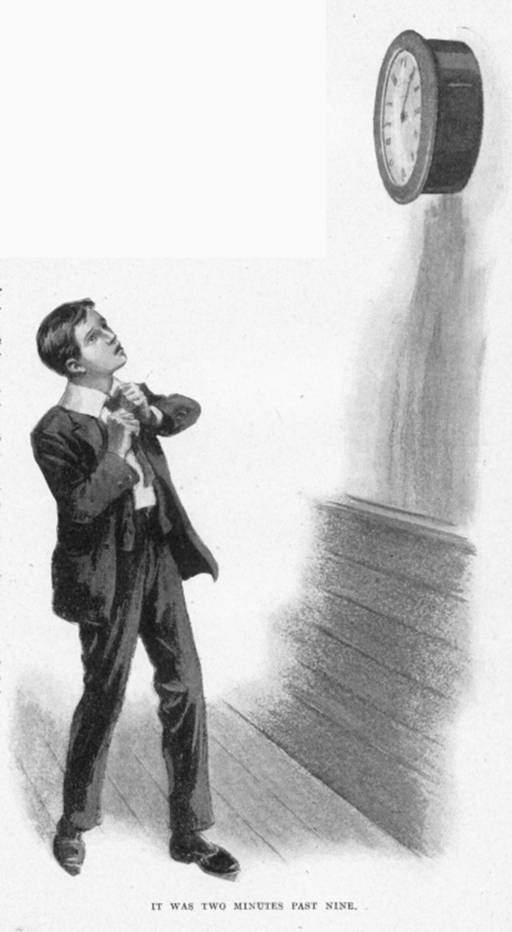
There was a little unpleasantness in his form room when he stole in at seven minutes past the hour. Mr. Dexter, his form-master, never a jolly sort of man to have dealings with, was rather bitter on the subject.
“You are incorrigibly lazy and unpunctual,” said Mr. Dexter, towards the end of the address. “You will do me a hundred lines.”
“Oo-o-o, sir-r,” said Chapple. But he felt at the time that it was not much of a repartee. After dinner there was the usual interview with Mr. Seymour.
“You were late again this morning,” he said.
“Yes, sir,” said Chapple.
“Two hundred lines.”
“Yes, sir.”
The thing was becoming monotonous.
Chapple pulled himself together. This must stop. He had said that several times previously, but now he meant it. Nor poppy, nor mandragora, nor all the drowsy syrups of the world should make him oversleep himself again. This time he would try a combination of schemes.
Before he went to bed that night he put his watch on half an hour, wound it up, and placed it on a chair at his bedside. Then he seized his rug and all the blankets except one, and tore them off. Then he piled them in an untidy heap in the most distant corner of the room. He meant to put temptation out of his reach. There should be no genial warmth on this occasion.
Nor was there. He woke at six feeling as if he were one solid chunk of ice. He put up with it in a torpid sort of way till seven. Then he could stand it no longer. It would not be pleasant getting up and going downstairs to the cheerless junior day-room, but it was the only thing to do. He knew that if he once wrapped himself in the blankets which stared at him invitingly from the opposite corner of the room, he was lost. So he crawled out of bed, shivering, washed unenthusiastically, and he proceeded to put on his clothes.
Downstairs it was more unpleasant than one would have believed possible. The day-room was in its usual state of disorder. The fire was not lit. There was a vague smell of apples. Life was very, very grey. There seemed no brightness in it at all.
He sat down at the table and began once more the task of constructing a handy model steam-engine, but he speedily realised, what he had suspected before, that the instructions were the work of a dangerous madman. What was the good of going on living when gibbering lunatics were allowed to write for weekly papers?
About this time his gloom was deepened by the discovery that a tin labelled mixed biscuits, which he had noticed in Brodie’s locker, was empty.
He thought he would go for a stroll. It would be beastly, of course, but not so beastly as sitting in the junior day-room.
It is just here that the tragedy begins to deepen.
Passing out of Seymour’s gate he met Brooke, of Appleby’s. Brooke wore an earnest, thoughtful expression.
“Hullo, Brooke,” said Chapple, “where are you off to?”
It seemed that Brooke was off to the carpenter’s shop. Hence the earnest, thoughtful expression. His mind was wrestling with certain pieces of wood which he proposed to fashion into photograph frames. There was always a steady demand in the school for photograph frames, and the gifted were in the habit of turning here and there an honest penny by means of them.
The artist soul is not always unfavourable to a gallery. Brooke said he didn’t mind if Chapple came along, only he wasn’t to go rotting about or anything. So Chapple went along.
Arrived at the carpenter’s shop, Brooke was soon absorbed in his labours. Chapple watched him for a time with the interest of a brother-worker, for had he not tried to construct handy model steam-engines in his day? Indeed, yes. After a while, however, the rôle of spectator began to pall. He wanted to do something. Wandering round the room he found a chisel, and upon the instant, in direct contravention of the treaty respecting rotting, he sat down and started carving his name on a smooth deal board which looked as if nobody wanted it. The pair worked on in silence, broken only by an occasional hard breath as the toil grew exciting. Chapple’s tongue was out and performing mystic evolutions as he carved the letters. He felt inspired.
He was beginning the A when he was brought to earth again by the voice of Brooke.
“You are an idiot,” said Brooke, complainingly. “That’s my board, and now you’ve spoilt it.”
Spoilt it! Chapple liked that! Spoilt it, if you please, when he had done a beautiful piece of carving on it!
“Well, it can’t be helped now,” said Brooke, philosophically. “I suppose it’s not your fault you’re such an ass. Anyhow, come on now. It’s struck eight.”
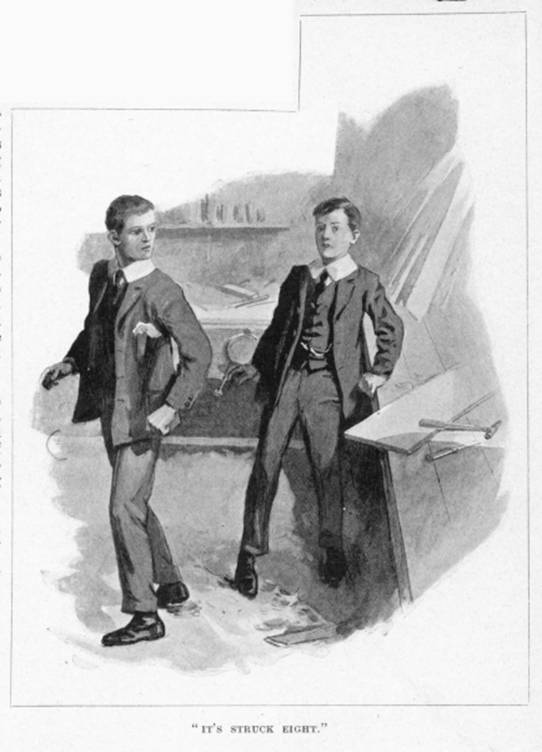
“It’s what?” gasped Chapple.
“Struck eight. But it doesn’t matter. Appleby never minds one being a bit late for breakfast.”
“Oh,” said Chapple. “Oh, doesn’t he!”
Go into Seymour’s at eight sharp any morning and look down the table, and you will see the face of G. M. Chapple—obscured every now and then, perhaps, by a coffee cup or a slice of bread and marmalade. He has not been late for three weeks. The spare room is now occupied by Postlethwaite, of the Upper Fourth, whose place in Milton’s dormitory has been taken by Chapple. Milton is the head of the house, and stands alone among the house prefects for the strenuousness of his methods in dealing with his dormitory. Nothing in this world is certain, but it is highly improbable that Chapple will be late again. There are swagger-sticks.

 Madame Eulalie’s Rare Plums
Madame Eulalie’s Rare Plums